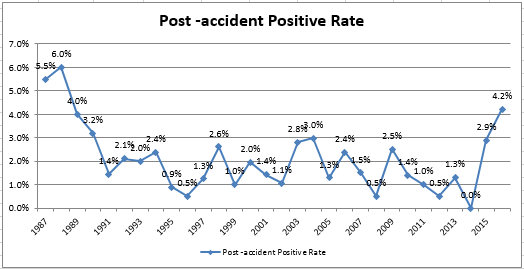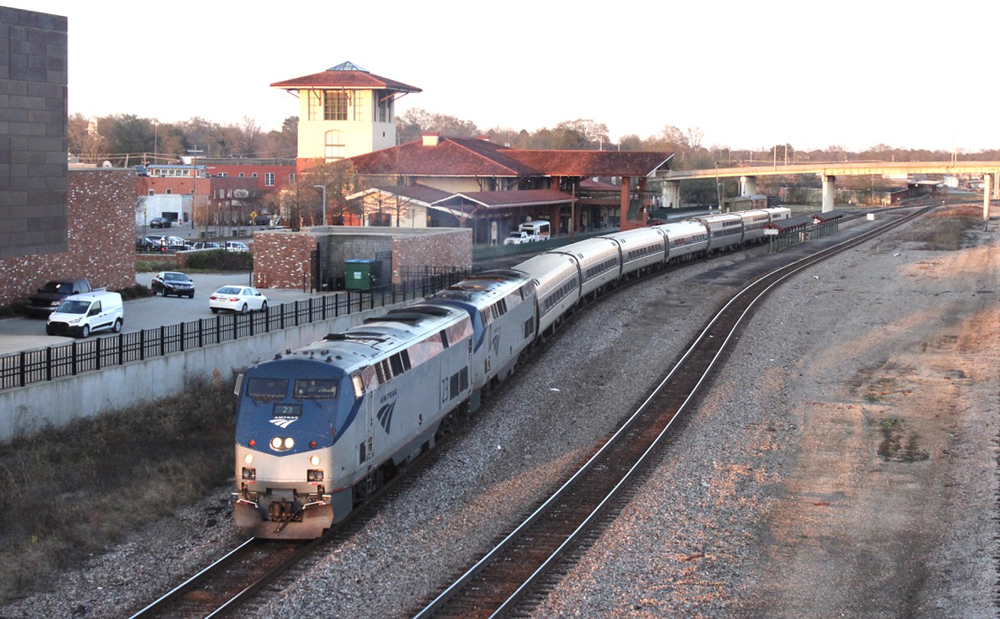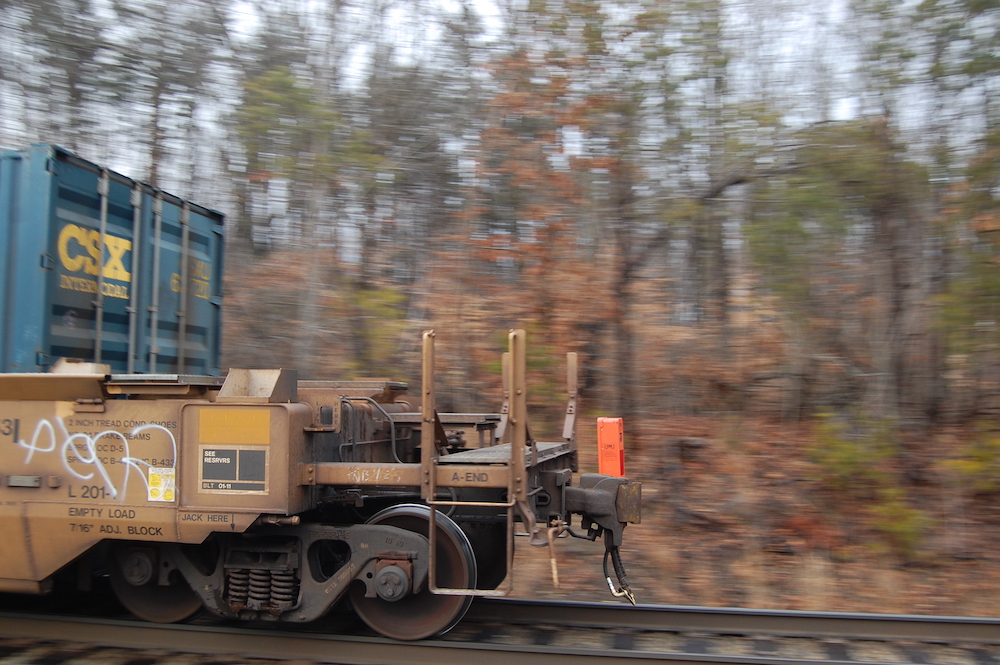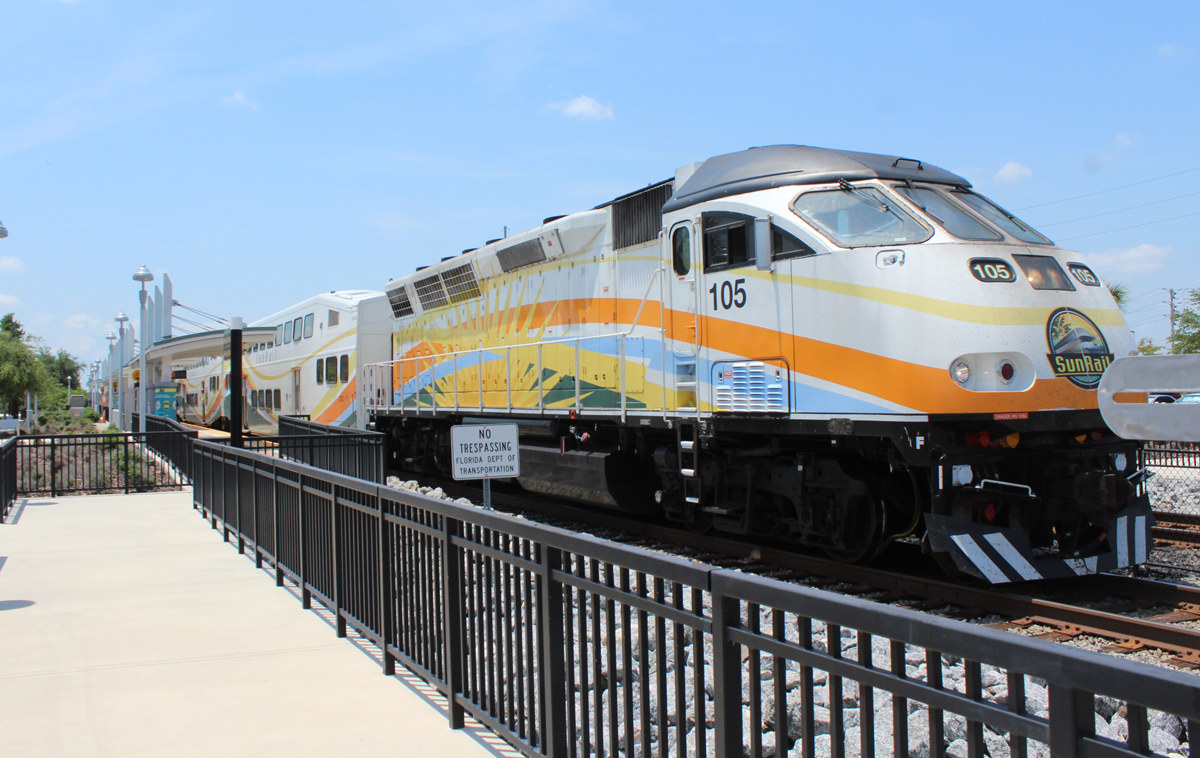While the NTSB concluded that drugs did not contribute to the fatal accident near Chester, Pa., that left two track workers dead, it reflects a troubling trend of drug use within the rail industry.
FRA data show that 4.2 percent of railroaders involved with accidents in 2016 tested positive for drugs such as marijuana, cocaine, ecstasy, benzodiazepine, OxyContin, and morphine. That was up from 2.9 percent in 2015. During FRA post-accident testing events, 6 percent of employees performing hours-of-service jobs tested positive, 14.3 percent of maintenance-of-way employees tested positive, and 33 percent of mechanical employees had drugs in their system, according to FRA data shared with Trains News Wire.
Overall, the number of railroaders — including engineers, train crew, and dispatchers — who tested positive for drugs during random tests increased by 19 percent from 2014 and 2015, according to the FRA.
The numbers, specifically those of post-accident positive rates, are on-par with what was found in the late 1980s when the FRA led a crackdown on drugs within the rail industry following another fatal Northeast Corridor collision. On Jan. 4, 1987, Amtrak’s Colonial collided with a set of Conrail locomotives near Chase, Md. Sixteen people, including 14 passengers and two Amtrak employees, were killed. It was later discovered that the crew aboard Conrail locomotives had been under the influence of marijuana and had failed to stop at a red signal.
At the time, 5.5 percent of railroad employees involved in an accident tested positive for drugs. In 1988, that rate increased to 6 percent. But since then there has been a steady decline, usually between 1 and 2.5 percent annually, but that began to rise in 2015.
FRA officials say they are taking the issue seriously. In May 2016, a month after the fatal Northeast Corridor wreck, the agency issued a new rule that expanded the scope of all drug and alcohol regulations to maintenance of employees.
“The FRA has been publicly sounding the alarm and taking proactive steps within our authority on this growing concern for some time,” FRA representative Tiffany Lindemann tells Trains News Wire. “We continue to urge all railroads to be vigilant in their substance testing and do all they can to ensure employees are not operating or working under the influence.”
In September 2016, then-FRA Administrator Sarah Feinberg spoke at the Railroad Safety Advisory Committee meeting and expressed her concern to both railroads and labor groups about the increase in drug use.
During the remarks, Feinberg said the increase in drug use among railroaders was unsurprising when put in the context of national drug use. She praised the industry for its self-imposed high standards of drug testing but also encouraged railroads to help employees struggling with addiction.
“FRA’s position about substance abuse among rail employees and workers is very clear: the FRA will have no patience whatsoever for post-accident positive test results–railroads, and railroad employees, have the safety of the public in their hands,” Feinberg said.
The trucking industry has seen similar drug-use rates in recent years. According to the Federal Motor Carrier Safety Administration, 5 percent of freight truck drivers involved in fatal crashes in 2014 tested positive for drugs.
In a statement to Trains News Wire, the Association of American Railroads notes that drug use is problem, although adds that all modes of transportation have seen an increase of drug use in recent years and that it reflects trends within the general population. AAR also supports any effort by the FRA to strengthen drug testing regulations and to have it include more drugs, such as opioids.
Trains News Wire reached out to the Brotherhood of Locomotive Engineers and Trainmen but they declined to comment for this story.















Legalizing drugs causes usage to decline? Legalizing increases availability and lowers prices. Last time I took an econ class, those things caused an increase in volume, not a decrease. Our most widely available drugs are alcohol and tobacco and it should be no surprise that they are also among the most widely consumed. This not only affects the safety of our railroads, it put everyone on the highway in jeopardy too.
I’m not sure what cash registers would be okay for someone on drugs….certainly not at a restaurant where food handling is involved. Others would be questionable also if making correct change is necessary. There are already a number of movements to self-checkout so companies don’t have to have people doing these jobs.
At a desk? What types of jobs would not require accuracy, the ability to concentrate clearly, etc? Most companies have clear no drugs or alcohol policies just for that reason.
In transportation, there are fewer and fewer jobs that don’t have drug and alcohol testing. The same applies for warehousing (especially food, pharmaceuticals, hazardous materials, etc.) where laws require testing. If the facility is covered by TWIC or many other security and safety regulations, the testing is there.
A look at the fastest growing job opportunities for the next decade (many supply chain related, security, nursing, home care, etc.) find that almost all have some testing requirements.
The issue is whether people are seeing the entire impact of their decisions or not. Right now, the transportation industry is seeing a rise in positive drug testing and the question is what is the cause and what can be done about it. One suspected cause is the push for “legal” drug use while at the same time more and more jobs require clean drug and alcohol histories.
@Barton Jennings
What Colorado is also doing is the smart thing that our Federal Govt should be doing for the so-called “war on drugs”…if you properly legalize the big drugs, with the right regulations, taxes, etc., over all drug use will decline. As for those that are addicted or get addicted and can’t pass exams to work in industries that require drug free employees, there are plenty of other jobs people can do were it doesn’t matter so much. Transportation and anyone operation heavy machinery or anything else that could cause death and destruction will always be job free, but do you see a problem with someone working a cash register or sitting at a desk? This is highly controversial, but it’s the last thing that the drug producing countries want to happen, because once the drugs are legalized then production leaves those countries and the income they derive from it dries up.
I agree that pot may not always be the biggest issue, but many folks can’t tell the difference. Making marijuana “legal” means to many folks that other stronger drugs are also okay. Another problem is that many marijuana blends are now stronger, and some also include the opioids and other drug types that are even stronger.
For example, Colorado has a bill proposed that would legalize meth, heroin, and other hard drugs. The state is making money off the pot, so they are now looking at more revenue from harder drugs. Also, drug users see an opening and are pushing for more drug access.
I have talked to several transportation and other companies who have already stopped recruiting in the state due to the issue, saying that most of those unemployed there are on drugs and can’t pass even the pre-employment application process.
Barton, I don’t disagree with your conclusion and your experience, but I don’t think it’s pot that is the big worry – it’s opiods, heroin and the like. I’d like to see some actual data though. Something has gone wrong in our country and drug use of that kind has really spiked. It’s causing all kinds of problems. For example the department of children and families is seeing twice as many kids pulled from homes needing foster care. It’s not surprising it would show up in transportation professions.
Back in the mid 1980s when I was a manager with a Class I, the first year of mandatory post-accident testing I saw almost 20% positive. It quickly went to well below 1%. However, with states like Colorado now saying that they won’t enforce federal laws against drugs like marijuana, many people think that the use of these drugs is now legal. I was in a meeting just last week where several students were yelling that drugs were legal and the the FRA and FMCSA couldn’t prevent their use by transportation employees, and certainly companies couldn’t ban them on their property. They just couldn’t see a safety issue, although one of the students was obviously high and could barely talk and walk. Unless a push is made again about the dangers of the use of drugs and alcohol on the job site, this percentage of positive tests will only go up, as will probably the accidents.